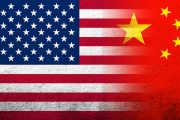
SINGAPORE — Amid an increasingly hostile business climate fostered by Chinese authoritarian leader Xi Jinping’s crackdown on private enterprise as well as public distrust of Chinese firms in the United States, global Chinese firms have been seeking to dissociate themselves from the Beijing regime on the international stage.
For example, TikTok moved its headquarters to Singapore in 2020. Recently, the company assured U.S. lawmakers that the move was not related to Chinese parent company ByteDance, since TikTok is operated by a Singaporean citizen from its main office in the city state.
Many other lesser-known Chinese giants are battling rising government regulations back home as well, prompting them to utilize a “duck and cover” strategy regarding their Chinese associations.
For example, the American subsidiary of Chinese agribusiness giant Fufeng Group has been fighting accusations by some U.S. politicians and local residents of “bringing the Chinese Communist Party” to Grand Forks, North Dakota.
Fufeng USA asserted that it has an “American leadership team,” and that its proposed project will be a “US plant, purchasing US corn, manufacturing in the US, to sell in the US.”
However, critics posit that Fufeng will use its proposed corn-mill plant, located near an Air Force base, as a platform for spying — notwithstanding federal approval of the project.
In Sidney, Ohio, a coming factory by Semcorp — a Shanghai-based tech company that manufactures a key component for electric vehicle batteries — led to a local uproar in April last year.
At a crowded city council hearing, some local residents, stating that China “was not our friend” had “already moved bombs and stuff closer to us” questioned why a Chinese firm had been given the green light to set up a base there.
On top of that, a communications manager of an unnamed multinational tech corporation with a present market value exceeding US$1 billion highlighted that the company is global and not Chinese. This firm manufactures smart devices for “green” applications.
This aforementioned communications manager spoke on condition of anonymity, for fear of reprisals.
Moreover, a look at the same company’s public-relations materials reveals claims that the firm has “operational headquarters” in the United States, Europe, and another Asian country outside China. Notably, the company did not mention another headquarters in Shenzhen, China, even though its official website explicitly states the Chinese city’s name. Additionally, the firm is engineering the move of its manufacturing facility to somewhere outside China.
Likewise, the regional head of another China-based company in the United States, who also requested anonymity, revealed to the South China Morning Post that the company’s goal now was to keep a low profile while leveraging on U.S. opportunities amid new regulations.
Mirroring the two examples above is the case of Zoom’s chief executive Eric Yuan, who was born in Taian, Shandong province, but in 2020 felt he needed to publish a statement asserting that he was an American citizen. Yuan emphasized that although the multinational video-conferencing company he helmed had offices in China, the firm’s headquarters was in California.
Tackling concerns that Zoom’s research and development center in China could be used by Beijing for espionage purposes, Yuan asserted that the center was only for the purposes of customer services and operations.
Also joining the bandwagon of firms decoupling from Xi’s regime is Shein, a popular e-commerce platform that was set up in Nanjing in 2008 and ensured its own supply chain system in Guangzhou by 2014. On the Shein website, the company describes itself as “a global fashion and lifestyle e-retailer” with “global offices” to reach “customers in 150 countries” without any indication of its Chinese origins.
In the wake of various business, health, and human-rights disputes, Shein shifted its assets and headquarters to Singapore in late 2021. Chris Xu, Shein’s founder and chief executive, has also become a permanent resident of Singapore and has allegedly also applied for citizenship.
Although the company said in 2021 that it has no plans for an initial public offering (IPO), an insider disclosed it has employed Goldman Sachs to explore such a possibility.
In November last year, Shein, now the world’s biggest fashion retailer, declared plans to construct a 170,000-square-foot warehouse and office in Canada near Toronto. Furthermore, the company also has a distribution center in Indiana. A second distribution center in southern California is poised to open in the first quarter of 2023.
A Chinese General Chamber of Commerce survey in July 2022 of 111 Chinese companies operating in the United States divulged that “optimism is in decline due to sustained trade disruptions and an increasingly uncertain regulatory environment.”
In the United States, the labels “made in China” and “China-based” — once touted as showcasing Chinese ingenuity and quality in global markets — have become politically contentious and have provoked regulatory actions.
Prominent targets of Washington’s regulatory sanctions include Huawei Technologies and ZTE — whose equipment was blocked in November over “unacceptable national security threats.” TikTok, the video app that has been involved in disputes with the U.S. government for over a year, faced penalties as well for its links with the Chinese communist regime.
As Sino-U.S. ties take a further nosedive, negative views on China have attained historic highs in the United States, with a Pew Research Center survey last year divulging that 82 percent of Americans harbor an unfavorable view of the Asian nation.
Such negative sentiments have hit Chinese businesses in the United States, while observers contend that such a climate has led global Chinese companies to distance themselves from China.
Anti-China sentiment in the United States has been piling up especially after Donald Trump became U.S. president in 2017 and singled out the Chinese communist regime for undermining American democracy and livelihoods.
In this emotional climate, it can be “very hazardous” for any business to be considered “Chinese,” said Chris Pereira of the North American Ecosystem Institute, a New York-based communications and business consultancy.
“The label of China can connect companies to geopolitics even when there is no real connection between a company and the Chinese government,” he added.
“We are seeing a major growing trend among Chinese companies that are aiming to ‘de-China’ themselves and localize their image and operations,” Pereira said.
Distancing themselves from China by establishing entities overseas is a “smart business strategy” of the firms, he opined.
Pereira pointed out the phenomenon of companies portraying themselves as being from “Hong Kong, or Singapore, or even just New York, while yet having an official headquarters in China.”
Also, these businesses were investing massively in market research, hiring more local teams and adopting local American software for internal communication and data storage.
U.S. President Joe Biden, in power since 2021, has seemingly adopted Trump’s position toward China, at least outwardly.
Trump lambasted China for “stealing” American manufacturing jobs and imposed 25 percent trade tariffs on Chinese imports worth US$300 billion. Biden has maintained some of Trump’s policies toward China and even went further in some cases. For example, Biden signed into law two key bills targeted at moving supply chains back to the United States or to American allies.
Back in China, Chinese businesses have been facing crackdowns as well, following the high-profile Communist Party clampdown of technology giant Alibaba’s founder Jack Ma in recent years. Ma has witnessed his fortune drop by around half to an estimated US$25 billion after the Beijing regime slammed the brakes on what would have been the world’s largest IPO in 2020.
To add fuel to the fire, Chinese regulators halted the planned listing of Ma’s Ant Group in Hong Kong and Shanghai, and the following year hit Alibaba with a huge US$2.75 billion fine for supposed unfair practices. Ant announced that Ma is ceding control of the fintech giant and will hold only about 6.2 percent of voting rights after the change. Many of Ma’s contemporaries have also given up their formal corporate roles and raised donations to charity to adhere to Xi’s vision of achieving “common prosperity.”


